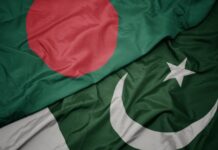On 14 June 2023, an Italy-bound rusty, aging, overloaded fishing trawler smuggling migrants sank in international waters in the part of the Mediterranean known as the Ionian Sea, off the coast of Pylos, Messenia, Greece. The boat, which had a capacity of 400 people carried an estimated 400 to 750 migrants, mostly from Pakistan, Syria, Palestine, and Egypt, and some from Afghanistan.
According to testimonies told by survivors, Pakistanis were allegedly forced below deck, with other nationalities allowed on the top deck, where they had a far greater chance of surviving a capsize. Pakistan’s then Interior Minister, Rana Sanaullah, said that there were at least 350 Pakistani victims on the overloaded vessel.
Human trafficking is a grave issue that plagues many nations across the globe, with Pakistan being no exception. This illicit trade in human lives not only robs individuals of their basic rights and dignity but also exposes them to unimaginable risks and dangers.
In Pakistan, the unholy alliance between human traffickers and corrupt government officers has allowed this menace to persist, causing widespread suffering and loss of life.
The Corrupt Nexus
At the heart of Pakistan’s human trafficking problem lies a distressing and intricate nexus between human traffickers and certain officials within government agencies, most notably the Federal Investigation Agency (FIA). This collusion not only allows the human trafficking network to thrive but also undermines the very institutions that are supposed to protect citizens.
The Federal Investigation Agency, entrusted with maintaining law and order, combating transnational crime, and safeguarding national security, has, in some instances, been compromised by corruption. Within its ranks, some individuals have allegedly formed alliances with human traffickers, either through accepting bribes or actively participating in trafficking operations. These rogue elements exploit their positions to facilitate the movement of victims, providing cover and information to traffickers to avoid detection.
It is believed that these compromised FIA officials aid traffickers by tipping them off about impending raids or investigations, allowing traffickers to evade capture and continue their illegal activities. This not only erodes public trust in law enforcement but also perpetuates a culture of impunity, emboldening traffickers to operate with little fear of consequences.
Moreover, the connection between corrupt officials and human traffickers has far-reaching consequences, as it extends beyond individual acts of bribery. These officials often protect and shield traffickers from prosecution, creating an environment where the criminal networks can operate without fear of being brought to justice. This further exacerbates the suffering of victims who are left vulnerable and unsupported, unable to escape the clutches of their exploiters.
Tragedy on the High Seas
One of the most heart-wrenching aspects of the human trafficking issue in Pakistan is the perilous journey many Pakistanis undertake to cross the sea into Europe. Driven by desperation and the hope for a better life, they board overcrowded and unseaworthy vessels, often at the mercy of human traffickers who care more about profit than human lives. Tragedies have struck far too frequently, with boats capsizing and lives lost. The media has documented several instances of such accidents, serving as a painful reminder of the risks involved.
Other recent instances of Pakistani migrants losing their lives
– In 2014, a boat carrying over 500 migrants, mostly Pakistanis, capsized off the coast of Malta, resulting in the deaths of more than 300 people. This incident highlighted the severity of the problem and the need for concerted action.
– Another tragic event occurred in 2020 when a boat carrying migrants from Pakistan and other countries capsized in the Mediterranean Sea. Survivors recounted tales of horror and despair, shedding light on the desperation that drives people to undertake such treacherous journeys.
Violations of International Laws
Pakistan’s failure to effectively combat human trafficking also raises concerns about its compliance with international laws and agreements. The United Nations Protocol to Prevent, Suppress and Punish Trafficking in Persons, Especially Women and Children, to which Pakistan is a signatory, calls for measures to prevent and combat trafficking, protect victims, and prosecute traffickers. By allowing human trafficking to persist, Pakistan is in breach of its international obligations and exposes its citizens to grave risks.
Conclusion
The issue of human trafficking in Pakistan is a multi-faceted problem that requires immediate and sustained action. Tackling this crisis demands a comprehensive approach that involves not only law enforcement efforts but also initiatives to address the root causes of trafficking, such as poverty and lack of opportunities. The corruption within government ranks must be addressed to sever the ties that sustain this illicit trade. The urgent need to root out corruption within law enforcement agencies and sever their ties with criminal networks cannot be overstated. Addressing this issue is pivotal in breaking the chains of human trafficking and creating a safer future for the citizens of Pakistan. Furthermore, international cooperation is essential to hold Pakistan accountable for its failure to uphold its obligations under international law. Only through such concerted efforts can the lives of countless Pakistanis be safeguarded from the clutches of human traffickers and their dangerous journeys to Europe come to an end.
